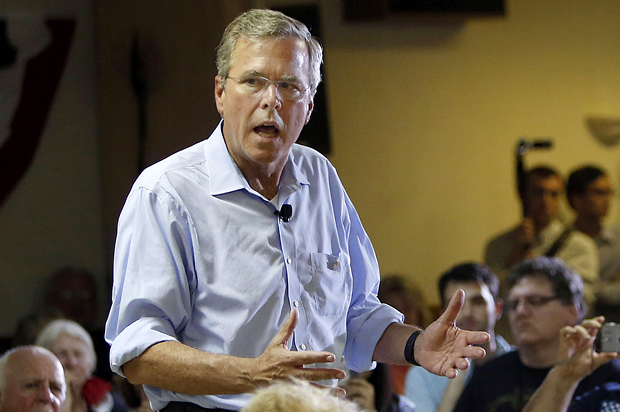It seems like every few weeks we get a new explanation for why Jeb Bush should continue running president. As the summer dragged and Donald Trump shot to the top of the national polls while Jeb’s support began to soften, Jeb’s plan was to use the debates to offer himself as a serious alternative to Trump, someone who could fix problems and get things done. He did that, and his numbers kept dropping. But not to worry, Jeb said as we transitioned to autumn, things will turn around once the mailers are sent out and the TV ads start airing in the early primary states. The mail went out and the ads were aired, and his numbers kept dropping. Here we are in late October, and JebWorld has a new rationale to offer: forget about the polls and forget about the early states, it’s all about money and delegates, and we’ll outlast everyone else.
Mike Murphy, the head of Jeb’s super PAC, Right to Rise, gave a big interview to Bloomberg’s Sasha Issenberg this week in which he laid out pretty much every facet of his strategic thinking regarding Jeb’s candidacy. His group has been blasting Iowa and New Hampshire with millions of dollars in pro-Jeb propaganda for the last several weeks, only to see his candidate’s numbers keep dropping. So it was revealing when he described how he sees the race shaking out once the voting starts and insisted that the early states won’t matter:
BLOOMBERG: During that period, you expect several candidates to be clumped together as far as delegates are concerned.
MURPHY: Yeah, for a while, for a while. I mean February’s not really about delegates, it’s about media momentum.
BLOOMBERG: When do you expect that to change?
MURPHY: March 15 is the big day. On the 16th, I don’t think anybody will have a mathematical lock, but there definitely will be a very strong leading candidate.
As Dave Weigel notes, this is the same thinking that animated Ron Paul’s 2012 campaign, which is weird given that Paul was an outsider running on an ideologically heterodox platform, while Bush is the concentrated essence of establishment Republican politics. The argument here is that Jeb, unlike other candidates, will have the financial resources to stay in the race basically forever, and once the other candidates flame out, their voters will come home to Team Bush. What they’re basing that assumption on is anyone’s guess, given that Republican voters seem to show nothing but growing contempt for Jeb as time goes by. The latest NBC/Wall Street Journal poll found that 44 percent of Republican primary voters could not see themselves supporting Bush.
Team Jeb has a different view of things, obviously. In Murphy’s vision of the 2016 primary, there are two “lanes” for candidates. “I’m more interested in what percent of the electorate is considering Jeb versus others,” he explained. “I’m interested in lanes, kind of the Grievance Lane versus the Optimistic Lane.” Jeb, obviously, falls into the Optimistic Lane. Candidates like Donald Trump, Ben Carson, Ted Cruz, and Mike Huckabee are the Grievance Lane inhabitants. But what about the other candidates? Specifically, what about Marco Rubio? He’s the big threat to steal away Jeb’s establishment support, so what does Murphy think of him?
Well, while Jeb is in the Optimistic Lane, Rubio is in the – wait for it – Cynical Lane:
MURPHY: What’s interesting about Marco’s campaign – and in the end I think all the essential truth of the stuff bubbles up to the voters and they sort it out pretty well – is there’s a cynicism to it. It’s cynical to run as the creature of new, fresh, while it’s all secret dark money. Maybe from one person, we don’t know. It’s cynical to say, “I’m going to take the lead on defeating this horrible Iran deal that we all hate,” and broadcast your ads to defeat that deal only on the Fox Network, where everybody is already against the deal, instead of running those ads on MSNBC to pressure Democratic senators that were the outcome to beating that deal. Cynically use it just to raise your name ID among Republican primary voters who already agree with you on the deal. There is a cynicism behind the young, fresh brand that I think is going to catch up with him.
Jeb himself previewed his anti-Rubio strategy earlier this month, questioning Rubio’s leadership capabilities and suggesting the young first-term senator wasn’t up for the rigors of the presidency. What Jeb and Murphy are doing here is a version of what Hillary Clinton tried to do to Barack Obama in 2008.
If you’ll recall, Obama spent basically the entire month of February 2008 dunking on Hillary, winning primary after primary and running up the delegate count. That prompted Hillary to attack the “Hope and Change” basis of Obama’s campaign and portray herself as someone who know how to do more than give speeches. “The skies will open, the light will come down, celestial choirs will be singing and everyone will know we should do the right thing and the world will be perfect,” she said of Obama’s message, laying on a thick layer of sarcasm. “Maybe I’ve just lived a little long, but I have no illusions about how hard this is going to be.” John McCain picked up the attack during the general election, casting Obama as an empty suit and a “celebrity.”
That strategy did little to stop Obama, even though Hillary still commanded the loyalty of a massive chunk of the party. The same attack might have a bit more potency against Rubio, given that Republican voters have had it drilled into their heads that first-term senators make bad presidents. The problem for Jeb is that he doesn’t have the credibility with Republican voters to make this attack stick. They already dislike him and have shown no interest in buying what he’s selling, and nothing Jeb does seems to change that.

